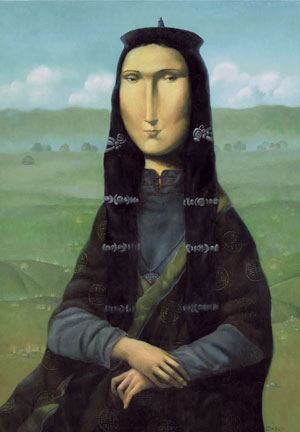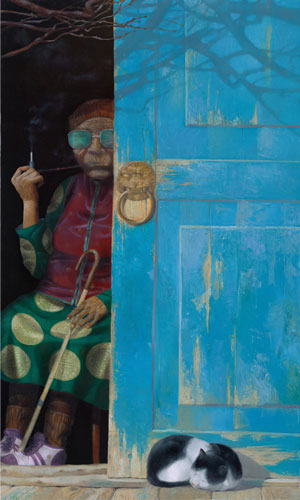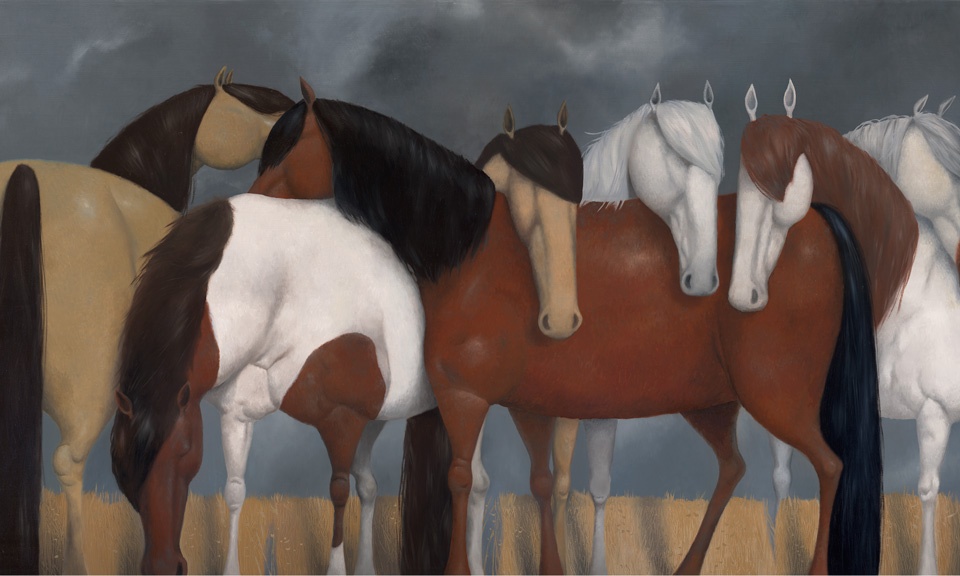Zorikto Dorzhiev
Zorikto Dorzhiev's Steppe Story
Foreword in Zorikto Dorzhiev's exhibition catalogueArtist: Zorikto Dorzhiev
I am honored to write a short preface to the catalogue of works of the great Buriyat artist Zorikto. As I consider doing so, I see before me his amazing painting, a Mongolian “Mona Lisa”! He has an incredible eye and hand, seeing the human comedy with unflinching compassion, a depicting the Mona Lisa’s Mongolian incarnation with extraordinary realism, power and beauty.
 He brings his divine feminine character and her landscape totally to life, on his mirror wisdom surface. All his works are pervaded by his kindly but relentless sense of humor, actually a form of compassion, sensitivity to the life and suffering of others, to find the unexpected, the amusing side of the tragic. He seems to see the inconceivability of the human beings. He translates to us his Mongolians, mysterious and primal, the absolute of earthiness combined with sky-like divine vastness.
He brings his divine feminine character and her landscape totally to life, on his mirror wisdom surface. All his works are pervaded by his kindly but relentless sense of humor, actually a form of compassion, sensitivity to the life and suffering of others, to find the unexpected, the amusing side of the tragic. He seems to see the inconceivability of the human beings. He translates to us his Mongolians, mysterious and primal, the absolute of earthiness combined with sky-like divine vastness.
His dominant subject is Mongolian individuals, men and women, human beings with live in one of the most difficult environments on earth, with the great help of the horse, the sheep, the yak, the cow, the goat. By focusing on this particular people, the people, he shows their universality. They conquered the greatest land empire in recorded history, ruthless with the violent, but benevolent to the cooperative The then gradually became devoted to the Buddha’s teaching of gentleness and intelligence, and became open, peaceful and happy, and of course, vulnerable. After being communist ideology and Russian and Chinese imperialisms.
 Now again, they arise in freedom and try to be themselves. Nowadays their women have taken charge, with 80% of the Ph. D.s, and many of the government jobs. They men are gingerly trying to go back out on the frozen steppes, move out on the frozen steppes, move out of the Russian collectives and return to nomadic freedom.
Now again, they arise in freedom and try to be themselves. Nowadays their women have taken charge, with 80% of the Ph. D.s, and many of the government jobs. They men are gingerly trying to go back out on the frozen steppes, move out on the frozen steppes, move out of the Russian collectives and return to nomadic freedom.
Zorikto’s paintings are a joy to look at. They are doorways into an artistic world, a world that makes our habitual world seem more vivid when we return. I am happy to visit them. All are invited to join.
Article from Zorikto Dorzhiev Steppe Story, published by Palace Editions, State Russian Museum, St. Petersburg. 2008

